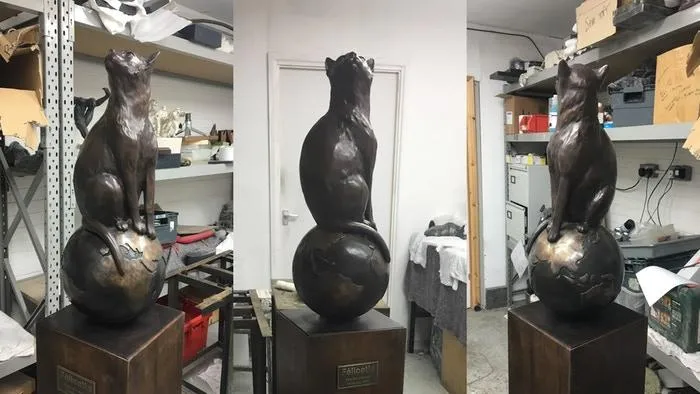Félicette, the First Cat in Space, Finally Gets a Memorial
Last month, a team unveiled a bronze statue honoring the feline, who launched on a suborbital mission in 1963
/https://tf-cmsv2-smithsonianmag-media.s3.amazonaws.com/filer/2a/09/2a096c01-30b3-4ea7-a92a-9abe8e7d2b9c/84040140bf1b4ea1b4e2d49d2665504c_original_copy.jpg)
Félicette, the only cat to have ever survived a sojourn into space, is now being recognized for her extraterrestrial achievements in the form of a bronze statue at the International Space University in Strasbourg, France.
The spacefaring feline was part of a 15-minute suborbital mission in 1963. Unveiled in December, the memorial is the culmination of a Kickstarter campaign launched in October 2017 by cosmic cat enthusiast Matthew Serge Guy. More than 1,100 patrons donated $57,000 to honor Félicette.
“It's time for The Astrocat to get the memorial she rightly deserves,” Guy wrote on the original campaign page.
Félicette, a petite tuxedo kitty, wasn’t the first non-human animal to leave our planet’s atmosphere. In their early bids for an eventual lunar landing, both the United States and the former USSR sent their own menageries of creatures into space, including a dog named Laika in 1957 and a chimpanzee called Ham in 1961. These efforts, using larger and larger creatures, were—though ethically hazy—intended as trial runs for humans, in part to study the effects of microgravity on mammalian bodies.
Before Félicette, France had so far only sent rats to space. After researchers at the Centre d'Enseignement et de Recherches de Médecine Aéronautique (CERMA) recruited 14 cats into a rigorous training program, Félicette—a sweet-tempered former stray—was granted the golden ticket, Emily Petsko reported for Mental Floss in 2018.

That October, Félicette—then designated C341—was launched from a base in the Sahara Desert, reaching an altitude of about 100 miles above Earth. The trip was brief, just 15 minutes in total. But all the while, scientists kept close tabs on the kitty, monitoring her breathing and heart rate through a series of electrodes implanted throughout her body. Eventually, the capsule that contained Félicette detached from its rocket and parachuted safely back to the ground. A few months after her return, she was euthanized so that the scientific team could examine her brain.
Despite Félicette’s scientific contributions, this intrepid feline has been mostly erased from history, Weitering wrote for Space.com in 2017, when Guy’s Kickstarter campaign first debuted. Upon his death, Ham the chimpanzee was eulogized, and his partial remains sent for burial at the International Space Hall of Fame, and at least two monuments have been constructed in memory of Laika the dog. But Félicette had yet to receive a comparable commemoration at the time of Guy’s campaign launch. A series of postage stamps, intended to celebrate the cat’s contributions, actually mislabeled her as a male cat named Felix.
Félicette’s obscurity may be tied in part to the way early spaceflight has been recorded: primarily as a race between the USSR and the United States, leaving France and its astronauts, human and otherwise, as a secondary character. Unlike American or Soviet animals, “Félicette doesn’t have a path to that larger history,” space historian Robert Pearlman told Rae Paoletta at Gizmodo in 2017.
But perhaps that will no longer be the case. Nearly six decades after her journey, Félicette is now immortalized in bronze. Her five-foot-tall statue, designed by sculptor Gill Parker, depicts her perched atop Earth, gazing up toward the skies she once traveled. The piece premiered on December 18, 2019, as a part of the 25th anniversary celebration of the International Space University’s Master of Space Studies program.
“It’s crazy to think a video I put online almost two and a half years ago has resulted in this,” Guy wrote in a Kickstarter update. “The internet’s an alright place sometimes.”
/https://tf-cmsv2-smithsonianmag-media.s3.amazonaws.com/accounts/headshot/10172852_10152012979290896_320129237_n.jpg)
/https://tf-cmsv2-smithsonianmag-media.s3.amazonaws.com/accounts/headshot/10172852_10152012979290896_320129237_n.jpg)